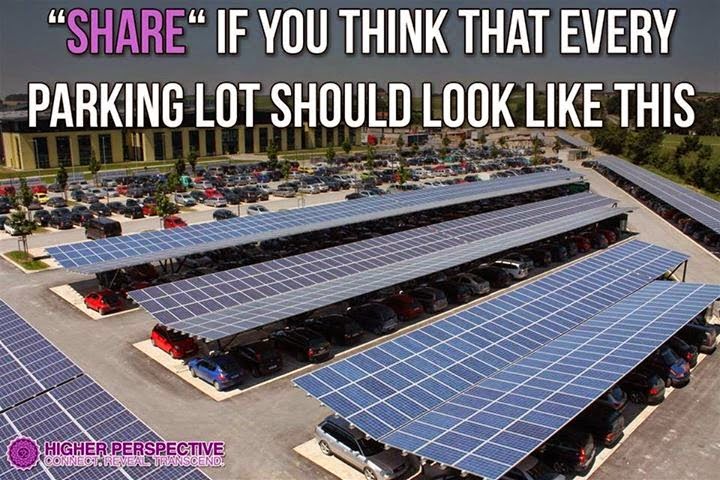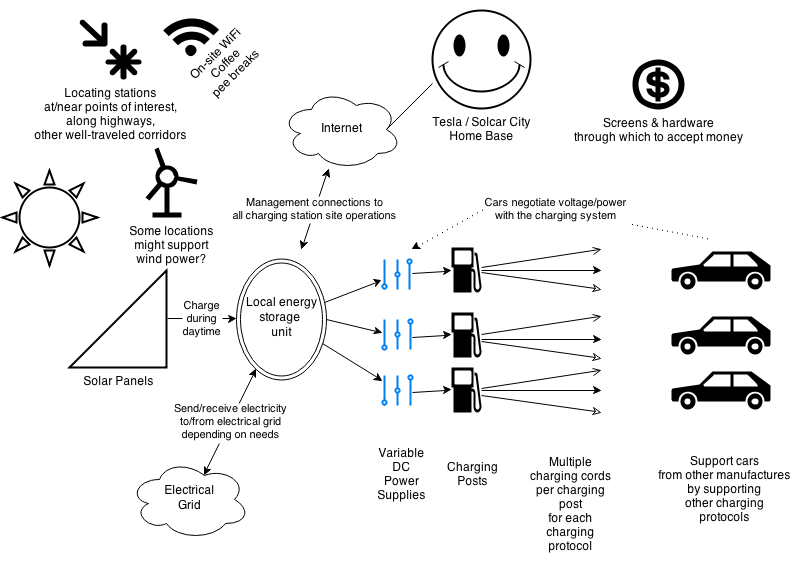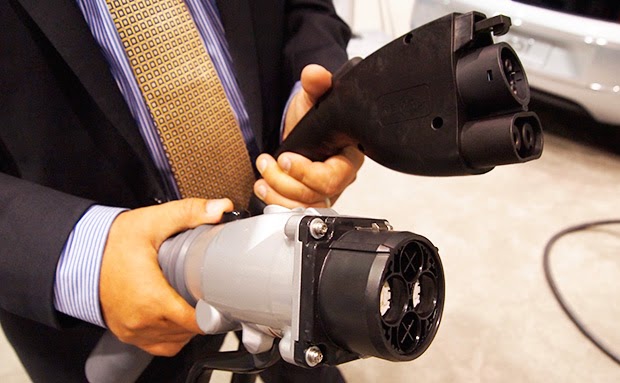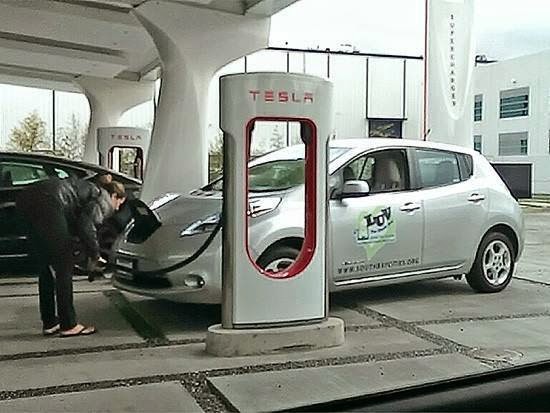 Will electric car charging always look as it does today – a few charging stations here and there? When there are hundreds of thousands of electric cars sold per year, won’t the current electric vehicle charging model be swamped? Maybe a company needs to reconceptualize the whole model? The rise of electric cars with fast charging capability gives us the opportunity to implement an electric charging center similar to gasoline stations, but electric. Maybe.
Will electric car charging always look as it does today – a few charging stations here and there? When there are hundreds of thousands of electric cars sold per year, won’t the current electric vehicle charging model be swamped? Maybe a company needs to reconceptualize the whole model? The rise of electric cars with fast charging capability gives us the opportunity to implement an electric charging center similar to gasoline stations, but electric. Maybe.
Who would do such a thing? What about a joint venture between Tesla Motors and Solar City? Those two companies are already collaborating to build the SuperCharger network so it can survive the Zombie Apocalypse. (meaning – solar panels and local energy storage capacity) Further, back in 2009 the two companies collaborated on building a network of charging stations at RaboBank locations between the Los Angeles and SF Bay area’s![]() . In other words, Elon Musks role as CEO and/or Chairman of both Tesla Motors and Solar City has allowed him to coordinate the two companies to work on products and solutions together.
. In other words, Elon Musks role as CEO and/or Chairman of both Tesla Motors and Solar City has allowed him to coordinate the two companies to work on products and solutions together.
But Tesla’s Supercharger system is explicitly only for Tesla’s cars. Would Elon Musk be interested in building charging station infrastructure to support cars built by other manufacturers? The Supercharger system is a marketing expense that makes the Model S (and Model X) more valuable.
It seems, therefore, Tesla/SolarCity wouldn’t move on offering the service described below. But it’s the kind of service we all badly need. We badly need to begin negating the need for things like the oil war that’s brewing in Ukraine today, or the two oil wars previously fought in Iraq. Oh, and that fracking thing has to stop. As do nuclear power stations, and coal power plants, and..and..and..
What would it look like? The inspiration for this blog post was driving by a gasoline station, and my head flipping it around to the question – how would that be different if every stall were electric? In other words, could there be an electric station that’s functionally similar to gasoline stations?
Society needs to develop a phrase to replace “gasoline station”. Let me humbly suggest “electric station”?
Here’s a quick diagram
If you refer to the Zombie Apocalypse story above, you’ll see it’s based on a conference call in which Elon Musk presented Tesla’s ultimate vision for the Supercharger network. Namely, that each location will have a half-a-megawatt-hour of local grid connected energy storage, and enough solar panels on site to supply enough power over a week for the charging typically required at that station. If Tesla (and Solar City) can pull this off, Tesla Motors won’t have to pay for electricity, but might even earn revenue from smart grid services.
The solar panels are there to keep the local energy storage unit charged up. The grid connection is there so that energy storage can be refilled if needed, say if there’s more cars than expected, or the sun isn’t shining enough that week, etc. Supercharger installations are typically put at locations with additional features, like restaurants or coffee shops or shopping, so that Model S owners aren’t sitting around twiddling their thumbs. Supercharger usage is free for Model S owners, it’s believed to be free for Model X owners, but we don’t know whether Tesla will charge the GenIII car owners for Supercharger usage.
What about owners of electric cars that can’t use Supercharger’s? Earlier I suggested that Tesla/SolarCity could be the company to build the ultimate electric stations. But there’s a key problem to solve … compatibility between the Supercharger port preferred by Tesla Motors, and other fast charging ports such as CHAdeMO or the Combo Charging System.
We’re currently in a Betamax/VHS phase of DC Fast Charging where multiple standards (and non-standards) are dueling for market share and adoption. Tesla’s Supercharger and CHAdeMO are the leading contenders for DC Fast Charging, but other standards may eventually supplant one or both. The Betamax/VHS standards battle was eventually won by DVD, right?
The way I envision this, Tesla Motors would develop a multi-charging-protocol implementation of the Supercharger system. Or, Tesla Motors could sell adapters allowing CHAdeMO and CCS car owners to use Supercharger’s. Or, it might not be Tesla and SolarCity, but some other company, one that’s independent of all the car makers, and who would be incentivized to build charging infrastructure that serves all electric car drivers. ChargePoint? In the latter case, Tesla would have to be convinced to allow 3rd parties to build Supercharger stations, or else Tesla might develop adapters for 3rd party fast charging systems.
Today there are fast charging stations that support CHAdeMO and CCS, but none that also support Tesla’s Supercharger system, meaning we cannot, today, build an electric station that serves every kind of electric car on the market. Instead we can build electric stations for CHAdeMO or CCS cars, and Tesla Motors is building electric stations for their cars, and never the twain shall meet.
It would be more valuable if electric stations were open for use by any electric car owner. Why? It’s because of the network effect – meaning, the value of a network is related to the number of users of that network. An electric station network that serves all electric car owners would be more valuable than the disunified situation we have today.
Revenue model? Today people wring their hands and moan that there isn’t a business model for electric car charging. I’m not sure I follow – because wouldn’t the business model be similar to existing gasoline stations? Maybe the real thing to bemoan is that, today, there aren’t enough people who need to charge their car in public to fund the business model?
That is – an electric station could include snacks/drinks/gizmo/condom/magazine sales just like we see at gasoline stations today. But, that model requires enough traffic through the facility to sell enough stuff to pay for its existence and profit. Additionally, the electric station owner could charge a fee to recharge a car, with the big question being how big the fee should be.
I think the fee has to be lower than the equivalent cost of gasoline. The solar panels might ensure the electric station owner doesn’t pay for electricity, and the local energy storage unit might ensure the electric station owner earns revenue from smart grid services. Even so, the electric station owner has to cover their costs for running the station, and should be able to charge for usage.
In other words – revenue could come from: smart grid services, selling electricity to the grid, a fee to charge cars, selling snacks etc, plastering advertising on the walls
Sounds great, when will these be available? Don’t expect this any time soon. I think the potential companies to do this are experimenting with concepts that might or might not look like this sketch. It’s clear that the model will works with more customers than exist today. Therefore, lots more electric cars have to be on the road to give enough traffic to make this viable.
Want to drive your car on gallons of sunshine? Let everyone know.
- Highway design could decrease death and injury risk, if “we” chose smarter designs - March 28, 2015
- GM really did trademark “range anxiety”, only later to abandon that mark - March 25, 2015
- US Government releases new regulations on hydraulic fracturing, that some call “toothless” - March 20, 2015
- Tesla Motors magic pill to solve range anxiety doesn’t quite instill range confidence - March 19, 2015
- Update on Galena IL oil train – 21 cars involved, which were the supposedly safer CP1232 design - March 7, 2015
- Another oil bomb train – why are they shipping crude oil by train? – Symptoms of fossil fuel addiction - March 6, 2015
- Chevron relinquishes fracking in Romania, as part of broader pull-out from Eastern European fracking operations - February 22, 2015
- Answer anti- electric car articles with truth and pride – truth outshines all distortions - February 19, 2015
- Apple taking big risk on developing a car? Please, Apple, don’t go there! - February 16, 2015
- Toyota, Nissan, Honda working on Japanese fuel cell infrastructure for Japanese government - February 12, 2015


















